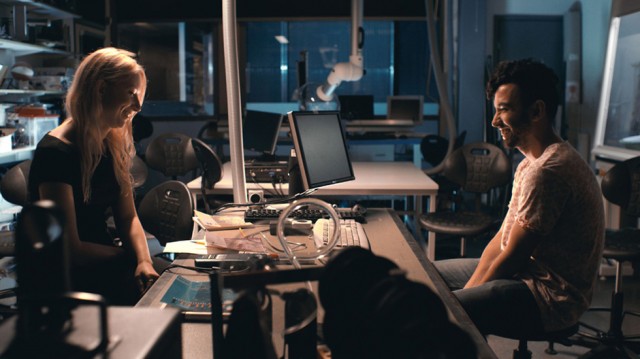
Todor Vlaev attempts to “hack” a woman in engaging documentary about engineers in Helsinki looking for love
LOVE & ENGINEERING (Tonislav Hristov, 2014)
Tuesday, April 22, Bow Tie Cinemas Chelsea, $12.50, 3:30
Thursday, April 24, Bow Tie Cinemas Chelsea, limited, 7:00
Saturday, April 26, Bow Tie Cinemas Chelsea, $20.50, 3:45
www.tribecafilm.com
 ”Did you hear the one about the engineer who didn’t have a girlfriend? He’s an engineer.” Engineers have been the butt of romance-related jokes probably going back millennia and, according to Tonislav Hristov’s engaging new documentary, Love & Engineering, perhaps with very good reason, particularly now in the digital age. “Love is the bio-program thing that could make you co-act with someone else,” Bulgarian 3D engineer and PhD Atanas Boev says at the beginning of the film. “Emotion is something, like, very inexplicable.” Boev is that rarest of men in his social circle: a happily married engineer, and he is somewhat of a hero to four other engineers who have come to him to learn how to become more successful with women. First, Todor Vlaev, Tuomas Nieminen, Markus Virtane, and Andon Nikolov attend Boev’s presentation, “The Secret Weapons of Pickup Masters: Get Every Woman in Bed with Three Simple Steps,” then Hristov (Rules of Single Life, Soul Food Stories), himself a divorced former engineer, follows them as they try to use Boev’s algorithmic teachings — he refers to women as “servers” and calls wooing “hacking — in various dating situations that are hysterically funny and sadly pathetic. The engineers, who all live and work in Helsinki, struggle to find topics of conversation — one can only talk about computer games — as the proud, stuttering Boev reviews their results with pseudoscientific explanations that see the woman as a “goal,” a “destination,” not as a human being, which could, um, be part of the problem. Oddly, the film subtitles everyone’s speech, even though understandable English is the only language spoken, and the transcription isn’t perfect, so it’s somewhat awkward to hear a character say something and then read words that don’t match exactly; there are even imperfect subtitles for a woman for whom English is her first language, and even her words are slightly changed. Of course, it’s worth repeating that the documentary was made by a former engineer, an occupation that requires a unique kind of precision. And special kudos go out to the various women who allowed themselves to be filmed interacting with this group of oddballs.
”Did you hear the one about the engineer who didn’t have a girlfriend? He’s an engineer.” Engineers have been the butt of romance-related jokes probably going back millennia and, according to Tonislav Hristov’s engaging new documentary, Love & Engineering, perhaps with very good reason, particularly now in the digital age. “Love is the bio-program thing that could make you co-act with someone else,” Bulgarian 3D engineer and PhD Atanas Boev says at the beginning of the film. “Emotion is something, like, very inexplicable.” Boev is that rarest of men in his social circle: a happily married engineer, and he is somewhat of a hero to four other engineers who have come to him to learn how to become more successful with women. First, Todor Vlaev, Tuomas Nieminen, Markus Virtane, and Andon Nikolov attend Boev’s presentation, “The Secret Weapons of Pickup Masters: Get Every Woman in Bed with Three Simple Steps,” then Hristov (Rules of Single Life, Soul Food Stories), himself a divorced former engineer, follows them as they try to use Boev’s algorithmic teachings — he refers to women as “servers” and calls wooing “hacking — in various dating situations that are hysterically funny and sadly pathetic. The engineers, who all live and work in Helsinki, struggle to find topics of conversation — one can only talk about computer games — as the proud, stuttering Boev reviews their results with pseudoscientific explanations that see the woman as a “goal,” a “destination,” not as a human being, which could, um, be part of the problem. Oddly, the film subtitles everyone’s speech, even though understandable English is the only language spoken, and the transcription isn’t perfect, so it’s somewhat awkward to hear a character say something and then read words that don’t match exactly; there are even imperfect subtitles for a woman for whom English is her first language, and even her words are slightly changed. Of course, it’s worth repeating that the documentary was made by a former engineer, an occupation that requires a unique kind of precision. And special kudos go out to the various women who allowed themselves to be filmed interacting with this group of oddballs.